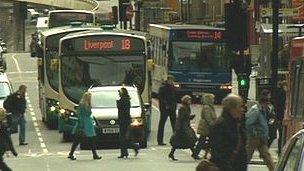Liverpool bus lanes suspended for nine month experiment
- Published
Bus lane cameras will be immobilised and will remain off for the duration of the trial
A nine-month experiment has begun to see what Liverpool will be like without bus lanes.
The city council is to study traffic flow during the trial, which follows mayor Joe Anderson's claims that bus lanes do not work.
Former transport minister Norman Baker expressed fears the experiment could lead to a fall in the number of bus passengers and cause more congestion.
Transport industry groups are also concerned about the change.
Bus operator Arriva Merseyside said it had not been consulted before the decision was made.
Managing director Howard Farrall said the suspension could lead to a "massive difference" in the service the company provided due to the possibility of delays.
A spokesman for its trade association, the Confederation of Passenger Transport UK (CPT), said the "point of bus lanes is to allow operators to run on time" and that the suspension would mean buses could now be delayed by "congestion and roadworks".
He said that "by running on time, bus operators hope to attract people out of cars, reducing congestion and helping the environment", adding that an experiment using bus lanes in Brighton had seen journey times reduced by up to 15 minutes.
'Crass move'
Mr Baker, who was transport minister prior to a cabinet reshuffle earlier in October, wrote to Mr Anderson expressing concern at the measure when it was announced.

At the end of the trial, the council will decide whether to reinstate any of the suspended lanes
He urged a more "targeted approach" as "once bus passengers are lost as a result of falling punctuality and reliability, experience suggests they would be hard to win back".
Green Party councillor John Coyne said the suspension was "a crass move", which was not based on proper analysis.
"The city centre movement strategy designed to keep cars round the edge of the city has been torn up on the Mayor's whim," he said.
Mr Coyne added that the move would be popular with motorists who "view the world from the windscreen of their car".
Mr Anderson said that "keeping the city moving for our motorists, businesses, residents, commuters and visitors is absolutely vital, so it's important we take a proper look at this".
"While we don't have extensive data, the evidence we do have suggests that bus lanes are not benefiting the city as planned, that they are not leading to an increase in bus usage, and that they may actually be making congestion worse.
"This trial is about getting the data we need so we can make an informed decision over this important issue."
At the end of the trial, the council will decide whether to reinstate any of the suspended lanes.
The suspension of the lanes means that all road users can now drive in them.
- Published9 October 2013
- Published27 September 2013
- Published19 September 2013
- Published17 September 2013
- Published18 March 2013
- Published2 November 2011